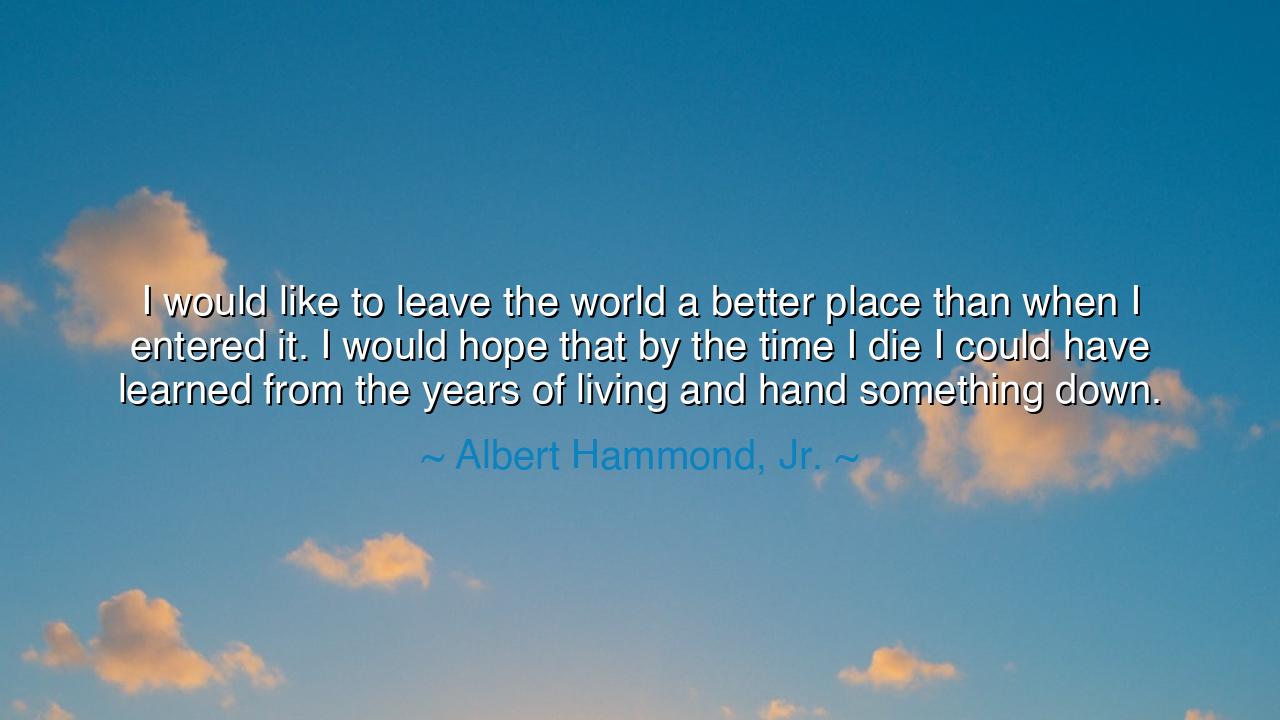
I would like to leave the world a better place than when I
I would like to leave the world a better place than when I entered it. I would hope that by the time I die I could have learned from the years of living and hand something down.






The words of Albert Hammond, Jr., “I would like to leave the world a better place than when I entered it. I would hope that by the time I die I could have learned from the years of living and hand something down,” rise like a quiet anthem of purpose — humble, yet eternal. In them speaks the yearning of the human spirit to make its journey through life not in vain, but as part of a greater unfolding. Hammond’s reflection, though born in the modern age, carries the tone of ancient wisdom: the belief that every life, however brief, holds within it the power to enrich the world. His words call to each of us — to live not merely to exist, but to contribute, to learn, and to leave behind traces of light for those who come after.
To leave the world a better place is the oldest aspiration known to humankind. From the sages of old to the artists, warriors, and healers of every age, the noble heart has always sought to give more than it takes. The ancients believed this was the measure of a soul’s greatness — not in wealth or conquest, but in how deeply one’s actions nurtured life after one’s passing. For what is a man or woman, if not a bridge between what was and what shall be? To hand something down, as Hammond says, is to fulfill the sacred duty of the living: to transform experience into wisdom, and wisdom into legacy. The body may fade, but the lessons, the kindness, the courage one leaves behind — these are the true immortality of humankind.
Hammond’s words are also the song of one who understands that growth and giving are inseparable. He does not wish to change the world through might or fame, but through the quiet alchemy of learning and sharing. “By the time I die,” he says, “I hope I could have learned.” This is humility in its purest form — the recognition that life itself is a school, and that our purpose is not perfection, but progression. The ancients taught the same truth: that wisdom is not the possession of the old, but the reward of those who learn consciously. The fool grows older; the wise grow deeper. And the truest sign of such learning is the desire to give it away — to pass the torch to others so that the light continues.
Consider the life of Mahatma Gandhi, who entered the world as an ordinary man and left it transformed by compassion and conviction. His greatness did not come from conquest or power, but from a lifelong pursuit of self-understanding and service. He said, “Be the change you wish to see in the world,” and through his example, he handed down to humanity a model of peace through strength. Gandhi’s life embodies Hammond’s words: he learned from his own failings, turned them into wisdom, and left behind a path for others to follow. Through him, we see that one person’s evolution can ripple across generations — that to learn deeply is to lift others with you.
And yet, Hammond’s vision is not only for the famous or the saintly — it belongs to all. To leave the world better does not demand great deeds, but conscious ones. A teacher who inspires a child, a friend who heals another’s sorrow, a craftsman who builds with care — each performs this sacred work. The world is not only shaped by empires; it is shaped by gestures of love and responsibility. Every act of kindness is a thread in the vast tapestry of human betterment. The wise understand that legacy is not something one leaves behind at death, but something one builds, moment by moment, while living.
His words also remind us of the importance of learning from life, not merely passing through it. Many live long yet never grow, clinging to comfort or resentment. But Hammond speaks of a different kind of living — one that looks upon every joy and sorrow as a teacher. To learn from life is to transform suffering into compassion, failure into humility, and success into gratitude. This kind of learning, when passed on, becomes the heritage of the soul — more enduring than monuments or wealth. It is the inheritance of wisdom, the only treasure that multiplies when shared.
So, my listener, take these words into your heart: you, too, are a custodian of the world. You entered it as a student; you must leave it as a teacher. Do not pass through the days unaware — learn from them. Gather their lessons, refine them with reflection, and hand them down through your deeds, your words, and your love. You may not see the fruit of your labor, but the seed you plant will bloom in unseen fields. This is how one makes the world better — not by seeking glory, but by living with purpose.
For as Albert Hammond, Jr. teaches, the measure of a life is not in what it gains, but in what it gives back. The wise do not seek to be remembered by name, but by influence — by the light they leave burning in others. So live, learn, and hand something down. For that is how the world turns forward — not by time alone, but by hope, wisdom, and the quiet courage to leave it better than we found it.






AAdministratorAdministrator
Welcome, honored guests. Please leave a comment, we will respond soon